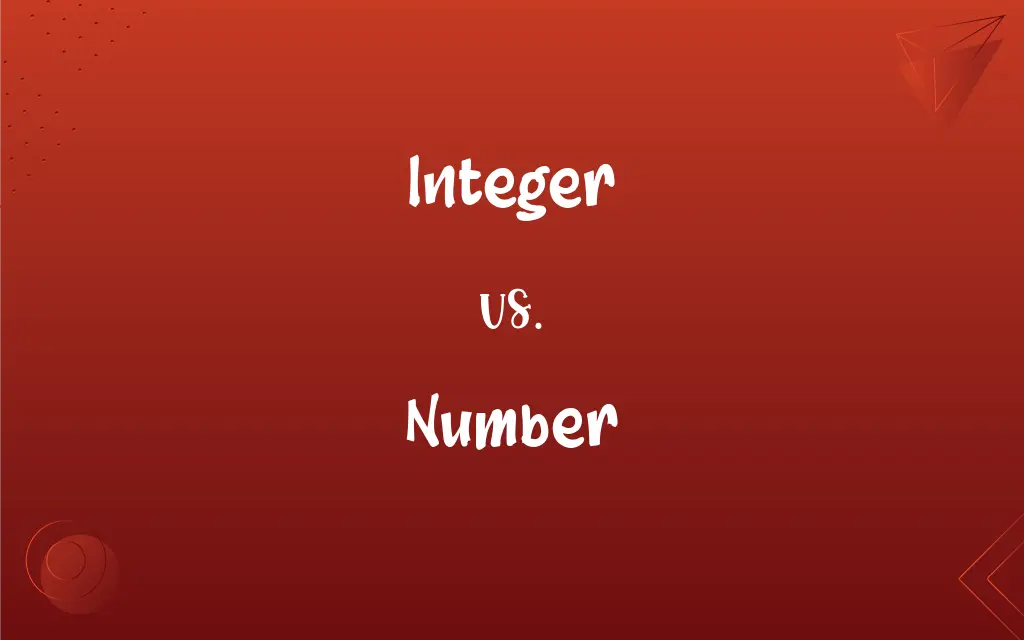Integer vs. Number: What's the Difference?
Edited by Aimie Carlson || By Harlon Moss || Published on January 9, 2024
Integer is a whole number, positive, negative, or zero. Number is a mathematical object used to count, measure, or label; includes integers, fractions, decimals, and more.

Key Differences
An integer is a type of number representing whole values without fractional or decimal parts. In contrast, the term number encompasses a broader range of values, including integers, but also fractions, decimals, and even irrational numbers. Both concepts are foundational in mathematics, with integers serving as a subset within the vast universe of numbers.
Integers include negative numbers, zero, and positive numbers, but exclude fractions and decimals. Numbers, on the other hand, cover a wider spectrum, including not only integers but also real numbers (like 3.14), rational numbers (like ½), and even complex numbers. This distinction highlights integers as a more specific category within the general concept of numbers.
In mathematics, integers are often used in counting and simple arithmetic. Numbers, with their broader definition, are employed in more complex mathematical operations and concepts, such as calculus and algebra. While every integer is a number, not every number is an integer, underscoring the more restricted nature of integers.
The representation of integers is typically straightforward, using digits without decimal points. Numbers, however, can have diverse representations, including decimals, fractions, and even in exponential form. This variety in representation reflects the expansive nature of numbers compared to the more uniform presentation of integers.
In computational contexts, integers have distinct implications, often used in programming for loop counters and discrete data manipulation. Numbers, particularly those with decimal parts, require more complex handling in computer programming, reflecting their varied nature in contrast to the more straightforward use of integers.
ADVERTISEMENT
Comparison Chart
Definition
A whole number without fractional parts.
A mathematical entity used for counting, measuring, and labeling, including fractions, decimals, etc.
Types
Positive, negative, or zero.
Includes integers, real, rational, irrational, and complex numbers.
Usage in Mathematics
Counting, ordering, basic arithmetic.
Advanced concepts like calculus, algebra, and statistical analysis.
Representation
No decimal or fractional part.
Can be represented as fractions, decimals, and even in exponential form.
Integer and Number Definitions
Integer
Integers include the set of natural numbers, their negatives, and zero.
10 is an integer.
ADVERTISEMENT
Number
Numbers can be represented in various forms, including integers, decimals, and fractions.
3.14 is the number representing the ratio of a circle's circumference to its diameter.
Integer
An integer is a number without a fractional or decimal component.
-22 is an integer.
Number
In mathematics, numbers are used in various operations like addition, subtraction, and more.
The number 15 is the result of adding 7 and 8.
Integer
In mathematics, integers represent discrete quantities.
0 is an integer used to represent no items.
Number
Numbers include a vast range of values, from negatives to positives, including zero.
-7 is a number indicating a deficit or subtraction.
Integer
Integers form a fundamental part of number theory.
7 is a prime integer.
Number
A number is a mathematical object used to count, measure, and label.
The number of apples in the basket is 5.
Integer
An integer is a whole number, either positive or negative or zero.
-5 is an integer.
Number
Numbers are fundamental to quantifying and understanding the world.
The number 100 signifies a century.
Integer
A member of the set of positive whole numbers {1, 2, 3, ... }, negative whole numbers {-1, -2, -3, ... }, and zero {0}.
Number
A member of the set of positive integers; one of a series of symbols of unique meaning in a fixed order that can be derived by counting.
Integer
A complete unit or entity.
Number
A member of any of the following sets of mathematical objects
Integers, rational numbers, real numbers, and complex numbers. These sets can be derived from the positive integers through various algebraic and analytic constructions.
Integer
(arithmetic) A number that is not a fraction; an element of the infinite and numerable set {..., -3, -2, -1, 0, 1, 2, 3, ...}.
Integer
A complete entity; a whole number, in contradistinction to a fraction or a mixed number.
Integer
Any of the natural numbers (positive or negative) or zero
FAQs
Are all integers numbers?
Yes, all integers are numbers.
What is an integer?
An integer is a whole number that can be positive, negative, or zero.
Is zero considered an integer?
Yes, zero is an integer.
Can numbers be irrational?
Yes, numbers include irrational numbers, but integers cannot be irrational.
Are decimals considered numbers?
Yes, decimals are a type of number.
Do integers include negative values?
Yes, integers include negative numbers.
Do numbers include complex numbers?
Yes, numbers include complex numbers.
Can a number be a fraction?
Yes, numbers can be fractions, unlike integers.
Can numbers represent quantities in science?
Yes, numbers are fundamental in representing scientific quantities.
What does the term number encompass?
Number refers to a mathematical object for counting, measuring, or labeling, including integers and more.
Are integers always whole numbers?
Yes, integers are always whole numbers.
Can numbers be infinite?
Yes, some numbers represent concepts of infinity.
Do numbers play a role in geometry?
Yes, numbers, including integers, are fundamental in geometry.
Are integers used in basic arithmetic?
Yes, integers are commonly used in basic arithmetic.
Can numbers be used in calculus?
Yes, numbers, especially non-integers, are used in calculus.
Do numbers include rational numbers?
Yes, numbers include rational numbers.
Are integers used in statistics?
Yes, but numbers, in general, are more commonly used in statistics.
Are integers used in computer programming?
Yes, integers are widely used in programming for discrete values.
Is the set of integers finite?
No, the set of integers is infinite.
Is an integer a type of number?
Yes, an integer is a specific type of number.
About Author
Written by
Harlon MossHarlon is a seasoned quality moderator and accomplished content writer for Difference Wiki. An alumnus of the prestigious University of California, he earned his degree in Computer Science. Leveraging his academic background, Harlon brings a meticulous and informed perspective to his work, ensuring content accuracy and excellence.
Edited by
Aimie CarlsonAimie Carlson, holding a master's degree in English literature, is a fervent English language enthusiast. She lends her writing talents to Difference Wiki, a prominent website that specializes in comparisons, offering readers insightful analyses that both captivate and inform.






































































